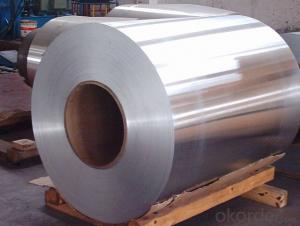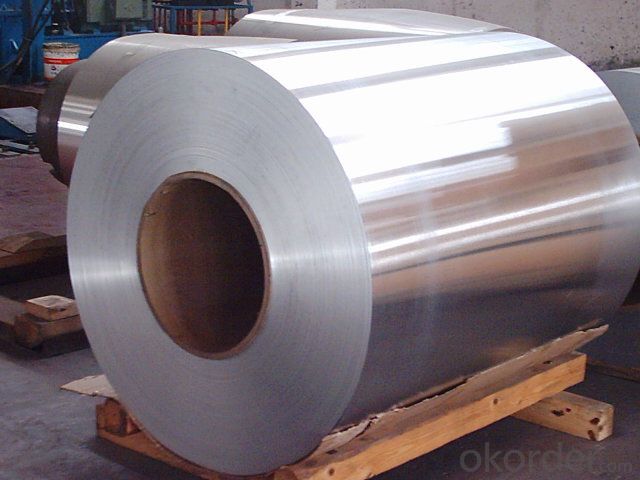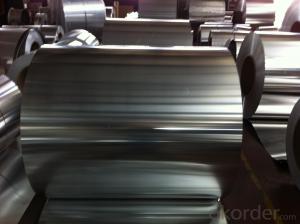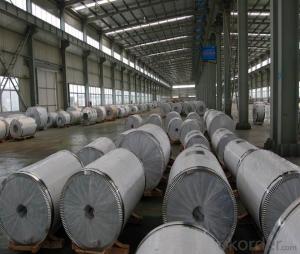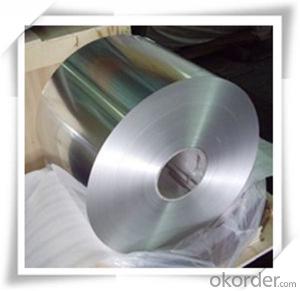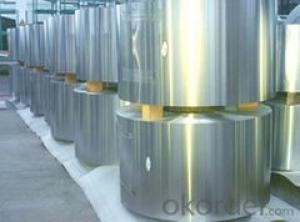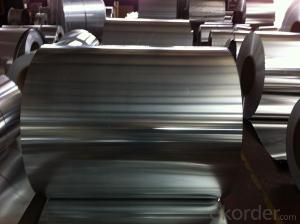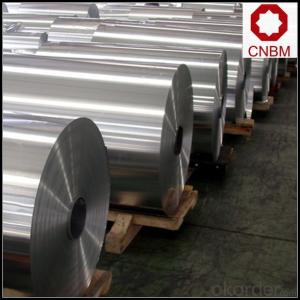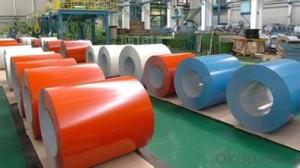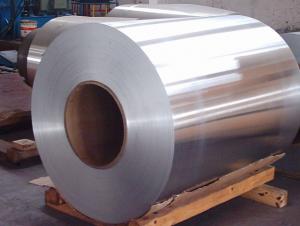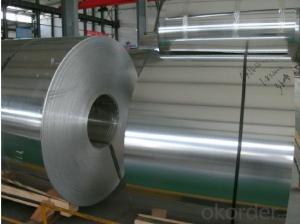6061 Aluminum Coil for Building - Aluminum Coil for Any Application
- Loading Port:
- China Main Port
- Payment Terms:
- TT OR LC
- Min Order Qty:
- -
- Supply Capability:
- -
OKorder Service Pledge
OKorder Financial Service
You Might Also Like
Aluminium foil acts as a total barrier to light and oxygen (which cause fats to oxidise or become rancid), odours and flavours, moistness, and germs, it is used broadly in food and pharmaceutical packaging. The purpose of aluminium is to make long-life packs (aseptic processing|aseptic packaging) for drinks and dairy goods, which allows storing without refrigeration. Aluminium foil containers and trays are used to bake pies and to pack takeaway meals, ready snacks and long life pet foods.
Aluminium foil is widely sold into the consumer market, often in rolls of 500 mm (20 in) width and several metres in length.It is used for wrapping food in order to preserve it, for example, when storing leftover food in a refrigerator (where it serves the additional purpose of preventing odour exchange), when taking sandwiches on a journey, or when selling some kinds of take-away or fast food. Tex-Mex restaurants in the United States, for example, typically provide take-away burritos wrapped in aluminium foil.
Aluminium foils thicker than 25 μm (1 mil) are impermeable to oxygen and water. Foils thinner than this become slightly permeable due to minute pinholes caused by the production process.
Aluminium foil has a shiny side and a matte side. The shiny side is produced when the aluminium is rolled during the final pass. It is difficult to produce rollers with a gap fine enough to cope with the foil gauge, therefore, for the final pass, two sheets are rolled at the same time, doubling the thickness of the gauge at entry to the rollers. When the sheets are later separated, the inside surface is dull, and the outside surface is shiny. This difference in the finish has led to the perception that favouring a side has an effect when cooking. While many believe that the different properties keep heat out when wrapped with the shiny finish facing out, and keep heat in with the shiny finish facing inwards, the actual difference is imperceptible without instrumentation.The reflectivity of bright aluminium foil is 88% while dull embossed foil is about 80%.
We provide a full range of precision aluminum strip for almost any application. We produce aluminum strip in a wide variety of alloys, including clad composites. Our aluminum strip can be produced in standard dimensions or custom made to your special requirements. We produce both imperial and metric units. We manufacture in compliance with the main international specifications, and tighter tolerances or custom tempers are available upon request. We offer various surface conditions, custom finishes (painting, anodizing, embossing), special processing, and multiple packaging options to meet our customer's unique requirements. The following is a summary of our capabilities.
Manufactured in compliance with the main international specifications and standards, including: Aluminum Association, ASTM, EN, and DIN.
We can also manufacture in compliance with other international standards including:ASME, SAE, AMS, AWS, FED, MIL, QQ, ISO, BS, AFNOR, JIS and GOST.
Manufactured in compliance with the main international specifications and standards.
Tighter tolerances are available upon request.
Aluminium (or aluminum; see spelling differences) is a chemical element in the boron group with symbol Al and atomic number 13. It is a silvery white, soft, ductile metal. Aluminium is the third most abundant element (after oxygen and silicon), and the most abundant metal in the Earth's crust. It makes up about 8% by weight of the Earth's solid surface. Aluminium metal is so chemically reactive that native specimens are rare and limited to extreme reducing environments. Instead, it is found combined in over 270 different minerals.The chief ore of aluminium is bauxite.
Aluminium is remarkable for the metal's low density and for its ability to resist corrosion due to the phenomenon of passivation. Structural components made from aluminium and its alloys are vital to the aerospace industry and are important in other areas of transportation and structural materials. The most useful compounds of aluminium, at least on a weight basis, are the oxides and sulfates.
Despite its prevalence in the environment, no known form of life uses aluminium salts metabolically. In keeping with its pervasiveness, aluminium is well tolerated by plants and animals. Owing to their prevalence, potential beneficial (or otherwise) biological roles of aluminium compounds are of continuing interest.
- Q: What are the effects of casting temperature on ductility of aluminum coil?
- The tensile strength and ductility increase with the solid solution insulation time, and reach best fit at 1 hour. Continue thermal insulation, and the tensile strength will change little while the ductility will reduce. This is because the solid solution over insulation will cause the work pieces crystallize so that the large crystal reduce the plasticity.
- Q: Are aluminum coils suitable for architectural façade systems?
- Yes, aluminum coils are suitable for architectural façade systems. Aluminum is a highly versatile and durable material that can be easily shaped and manipulated to meet the specific design requirements of a building's façade. It is lightweight, corrosion-resistant, and can withstand harsh weather conditions, making it an ideal choice for long-lasting exterior applications. Additionally, aluminum coils can be coated with various finishes, such as paint or anodizing, to enhance their aesthetic appeal and provide additional protection against fading or chipping. The flexibility and versatility of aluminum coils make them an excellent option for architectural façade systems, allowing for creative and unique designs while maintaining durability and performance.
- Q: What do the two items (COIL:873347 HEAT: number) on the label of the raw material of aluminum coil stand for?
- COIL means aluminum coil and HEAT means heating, so together they mean hot rolled coil.
- Q: Can aluminum coils be used for electrical transformers?
- Yes, aluminum coils can be used for electrical transformers. Aluminum is a suitable material for transformer coils due to its high electrical conductivity and lower cost compared to copper. While copper has traditionally been the preferred choice for transformer windings, the use of aluminum has gained popularity in recent years due to its lighter weight and lower price. Aluminum coils are also advantageous in terms of thermal conductivity, as they dissipate heat more efficiently than copper. However, it is important to consider the specific requirements and design considerations of the transformer, as the choice between aluminum and copper coils may depend on factors such as voltage, current, size, and insulation requirements.
- Q: What are the common surface finishes available for aluminum coils?
- The common surface finishes available for aluminum coils include mill finish, anodized finish, painted finish, and laminated finish.
- Q: What happened to the aluminum coil coming out of the annealing furnace?
- There is oil on the aluminum coil and the annealing time is too long.
- Q: We are working on a new aluminum fixture. It is basically an aluminum spine with many 6061-T6 pins sticking out. Currently we drill the holes inside the spine and hammer the 5/32 6061-T6 pins inside. Is there anyway to cast aluminum with many 6061-T6 pins embedded (they will stick out after the casting)?
- How long are the pins? have you considered casting the pins along with the rest of the part? or is that what you are asking, it sounds, like you are talking about loading pins into the mold and having the cast spine bond with them. What casting process are you using, or are you even using a casting now, or is the spine currently rolled or extruded shapes? As mentioned on RCM, the pins will no longer be T6 after casting, if you need the T6 temper the part will have to be heat treated.
- Q: If so why does an aluminum bend or get nicked or break quickly?
- It depends on how you set the criteria of comparison. If you go by volume, Aluminum isn't stronger. That's why a steel can is stronger than one of similar size and thickness. If you go by weight, aluminum is said to be stronger. Let's say we were looking to create a wall, spec'ed to a particular height and width, and just thick enough to hold back a given PSI of pressure. The aluminum one would have to be thicker to have the strength to hold back the pressure, but it'd be lighter than the steel equivalent. Also, the ease by which a material can be nicked isn't an indicator of strength but of hardness. Harder, isn't necessarily stronger.
- Q: Is it possible to create a mobile phone stand or holder using aluminum coils?
- <p>Yes, you can use aluminum coils to make a mobile phone stand or holder. Aluminum is lightweight, durable, and easy to shape, making it a suitable material for such DIY projects. You can bend the aluminum coil into the desired shape to support your phone, either horizontally or vertically. Ensure the coil's diameter is appropriate to hold your phone securely without causing any damage. Remember to smooth any rough edges to prevent scratches on your phone.</p>
- Q: What are the potential applications of recycled aluminum coils?
- Due to their numerous advantageous properties, recycled aluminum coils offer a wide range of potential applications. One such application lies in the manufacturing of automotive parts, where aluminum coils can be utilized to create lightweight body panels, engine components, and structural parts. This, in turn, can effectively decrease the overall weight of vehicles, leading to enhanced fuel efficiency and reduced emissions. In the construction industry, recycled aluminum coils can be employed to produce roofing materials, siding, gutters, and window frames. Aluminum's durability, corrosion resistance, and ability to withstand extreme weather conditions make it an ideal choice for construction purposes. Moreover, packaging materials can benefit from the use of recycled aluminum coils. Aluminum's exceptional barrier properties make it a popular choice for manufacturing beverage cans, food containers, and foil packaging. This aids in preserving the freshness and quality of the packaged products, while also reducing the environmental impact associated with the production of new aluminum and minimizing waste. Furthermore, the production of electrical equipment can make use of recycled aluminum coils. Aluminum's excellent conductivity of electricity makes it suitable for manufacturing electrical wires, cables, and other components. This not only conserves energy but also reduces the necessity for extracting and processing virgin aluminum. In conclusion, the potential applications of recycled aluminum coils span across various sectors, including automotive, construction, packaging, and electrical equipment. By embracing the utilization of recycled aluminum coils, we can achieve both environmental and economic benefits by reducing waste, conserving resources, and promoting sustainability.
Send your message to us
6061 Aluminum Coil for Building - Aluminum Coil for Any Application
- Loading Port:
- China Main Port
- Payment Terms:
- TT OR LC
- Min Order Qty:
- -
- Supply Capability:
- -
OKorder Service Pledge
OKorder Financial Service
Similar products
Hot products
Hot Searches
Related keywords
